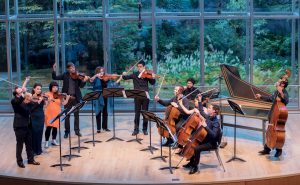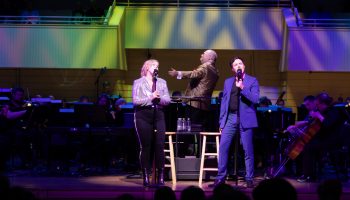
The members of ChamberFest Cleveland are bringing three classical masterpieces back into conversation.
The group will perform “Precocious Virtuosity,” a set of three compositions at 4 p.m. today, July 1, in Elizabeth S. Lenna Hall. This recital focuses on composers who were catapulted into musical fame at young ages: Wolfgang Amadeus Mozart, Felix Mendelssohn and Moritz Moszkowski.
ChamberFest Cleveland is a yearly festival that features both new and returning members every summer. Their performance today opens with Mozart’s Piano Quartet No. 1 in G Minor, K. 478.
Jessica Bodner, a celebrated violinist, Harvard University faculty member and repeat performer with ChamberFest Cleveland, said the piece’s precise quality makes it perfect for chamber groups — especially for her group.
“The Mozart is a beautifully pristine, perfect piece of music,” Bodner said. “The group of people that I’m playing it with are wonderful musicians — it’s a total dream to play that pristine piece in that situation.”
ChamberFest Cleveland will also perform Mendelssohn’s Octet in E-flat major, Op. 20. Bodner said the popular piece is a key part of any chamber musician’s repertoire — and that its composer perfectly fits the theme of “Precocious Virtuosity.”
“Mendelssohn was a prodigy; he wrote this piece when he was 16 years old,” Bodner said. “It’s just this outpouring of a masterpiece from such a masterful mind.”
The last piece on ChamberFest Cleveland’s program is Moszkowski’s Suite for Two Violins and Piano, Op. 71. Itamar Zorman, an internationally acclaimed performer and three-time violinist with ChamberFest Cleveland, said Moszkowski’s piece is the least known on the program, but that its melodic, Romantic qualities make it another masterpiece.
“The piece that’s less well-known is the Moszkowski,” Zorman said. “This piece is very brilliant, first of all, and wonderfully melodic. Throughout, it has something of … this Romantic spirit; a somewhat gentle, personal sort of music-making.”
According to Bodner, that “personal sort of music-making” is not limited to one piece. Instead, it is a key quality of chamber music — a performance style that features a small group of musicians with individual roles.
“I think that chamber music performances can be one of the most dynamic performances, because there’s this personal energy that’s pulsing through the group when everyone is communicating well,” Bodner said.
Zorman agreed, describing chamber music as a form of conversation.
“From the audience’s perspective, part of the excitement is just watching (the musicians) interact — watching how they literally communicate with notes, with music on the stage,” Zorman said.
With a small group like ChamberFest Cleveland, Zorman said, unique personalities and styles can shine — and they can create something new.
“From a broader perspective, when you put a small group on stage, you put different personalities and playing styles (together),” Zorman said. “It’s like you’re putting together a dish. Sometimes things really don’t work well, but when they do, the sum can be larger than its parts. Something new and special can come out of it.”
To Bodner, chamber music is unique among performance types because every member performs an individual part.
“A soloist has the responsibility of just taking care of that one part, and in an orchestra you don’t really get an individual voice because you’re part of a larger section,” Bodner said. “But with chamber music, you have a soloistic element where you’re the only person playing your part, but then you get to play off of each other and have this great dialogue.”
According to new member and Juilliard School violinist, Nathan Meltzer, the festival filled a major gap in Cleveland when founders Franklin and Diana Cohen launched it in 2012.




